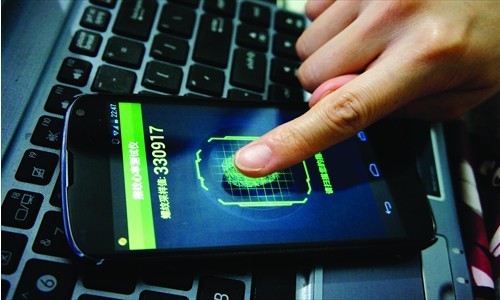
 |
| Heartbeat Test (Xinlü Celiang, free, Chinese only) uses touchscreen sensitivity to test your pulse. (Photo: Li Hao/GT) |
Are users 'being deceived'?
Zhang Ran, a Beijing resident, was less satisfied with her experience using a diagnostic app. After downloading TCM Testing Device (Zhongyi Zhenbing Zhidao, free, Chinese only), she filled out a questionnaire about her habits and symptoms and was told she had a urinary tract infection that would require medicine to clear up. In the days between that app diagnosis and her doctor visit, she grew anxious.
"It got on my nerves for days afterward, and I couldn't even sleep well," she said.
But when she went in to see the doctor, she checked out just fine. Although happy to hear this, Zhang was still troubled by the false diagnosis.
"I felt that I was being deceived. From now on, I won't take this device seriously," she said.
There are few barriers keeping inaccurate apps from entering this growing market.
"If a person receives a wrong diagnosis from mobile testing and consequently misses their golden time for seeing a doctor, it's not for sure that the designer of the application has to take responsibility for it," Gao, the app developer, said. Although smartphones can increasingly be used to measure health, they are not designed for more complicated tests. Gao said that this is why many of these apps include an "only for your reference" disclaimer.
Distributors of the apps, such as Apple, also shirk all responsibility. A public relations staffer at Apple's Beijing office, who requested anonymity because she did not have permission to speak with the media, said that although Apple reviews each app before it is sold in its App Store, they can't play the same regulating role a health authority could.


















 Steel roses: woman police in training
Steel roses: woman police in training


![]()
